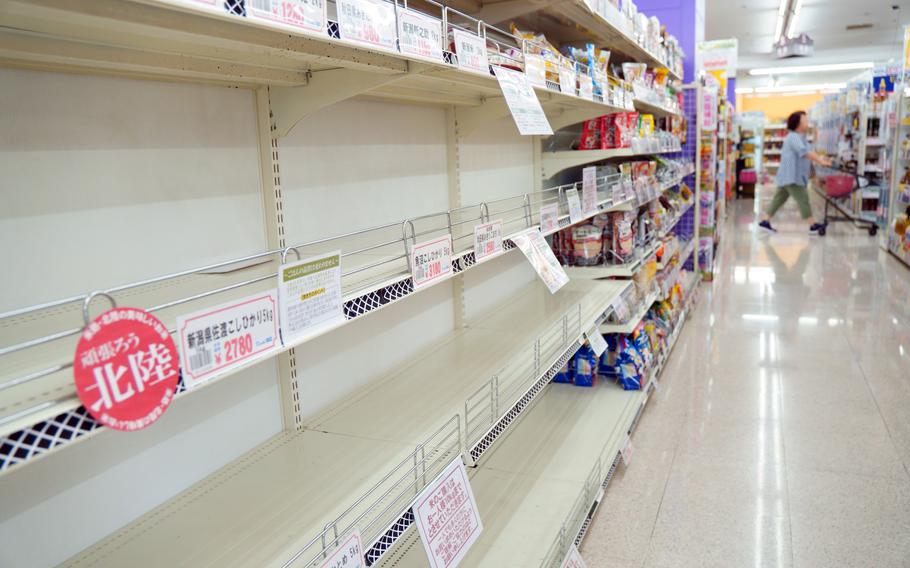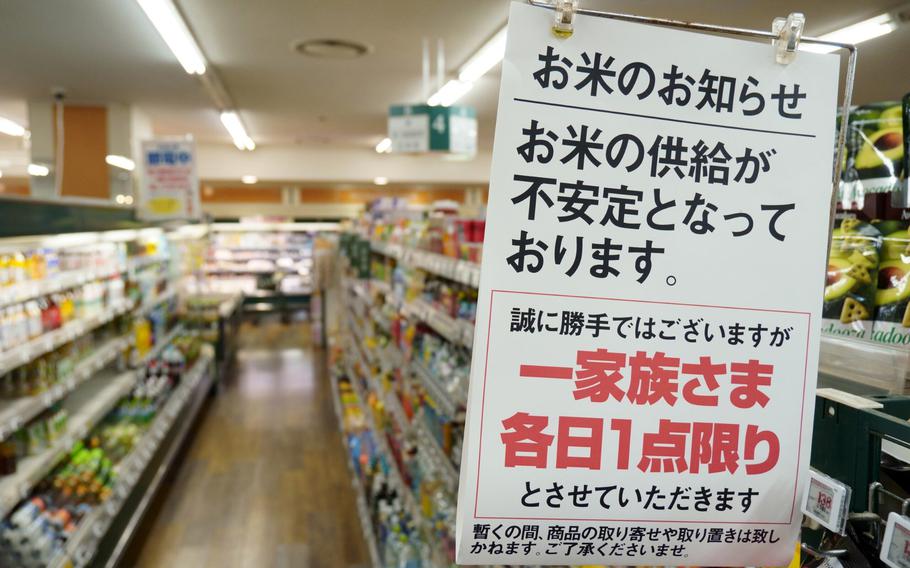
Shelves that normally stock bags of white rice were empty at a supermarket in Yokohama, Japan, Wednesday, Aug. 28, 2024. (Akifumi Ishikawa/Stars and Stripes)
TOKYO — Rice has become scarce or gone completely missing from shelves at some stores in Japan thanks to the threat of a megaquake, typhoons and a weeklong national holiday.
Japan’s agriculture minister asked consumers to refrain from “panic buying” rice, assuring them at a news conference Tuesday that this year’s harvest will arrive soon in their local grocery stores.
Demand for rice was high in August, when stocks are typically low, thanks to a conflation of events: earthquakes and a government warning to prepare for an imminent megaquake in central Japan, along with two typhoons, so far, this season, said Minister of Agriculture, Forestry and Fisheries Tetsushi Sakamoto.
Plus, transportation companies delayed their deliveries during the Obon holiday, a weeklong and usually offseason event, he said.
Nobuko Stratton, the Japan-born wife of Defense Department civilian employee Joseph Stratton, said she’s been unable to find rice anywhere outside of Yokota Air Base, where her husband works for the 374th Maintenance Group.
“I eat rice every day,” she told Stars and Stripes on Wednesday via Facebook Messenger. “It’s just how I was raised. When I went to the states for the first time and spent the first week without eating rice, I started to have a stomachache. I don’t want to see bread and pasta anymore.”
In neighboring Fussa city, the Seiyu supermarket was out of bags of rice, a store clerk said by phone Wednesday morning.
“When we get them in, they are sold out quickly,” she said.
The Marufuji grocery store on Fussa’s east side is also out of rice, a clerk said by phone that day.
“We do get some in but not every day,” the clerk said. She said rice became scarce earlier this month.
Both stores limit sales to one bag per customer, said both clerks, who declined to be named because they did not have authority to speak to media.
At Yokota’s commissary, plenty of rice is available, Stratton said. But it’s American brands like Nishiki, Minute and Blue Ribbon, which differ from Japanese rice.
“I can tell the difference; Japanese is sweeter and stickier,” she said. “I’d just like the situation to be back to normal, where I can find bags of rice anywhere at any time.”

Rice was limited to one bag per household at a supermarket in Yokohama, Japan, Wednesday, Aug. 28, 2024. The stock was sold out that day. (Akifumi Ishikawa/Stars and Stripes)
In 2023, Japan consumed 18 billion pounds of rice, compared to 10 billion pounds in the United States, according to Statista, a consumer survey database.
Other factors contributing to the rice deficit include increased demand related to record numbers of foreign tourists and smaller harvests due to hot weather and water shortages, according to a Japan Times article Wednesday.
The shortages should be resolved soon, Sakamoto said. Newly harvested rice will be distributed in September.
“We expect the rice shortage to gradually improve going forward,” he said. “We ask consumers to act calmly and purchase only the amount of rice they need.”